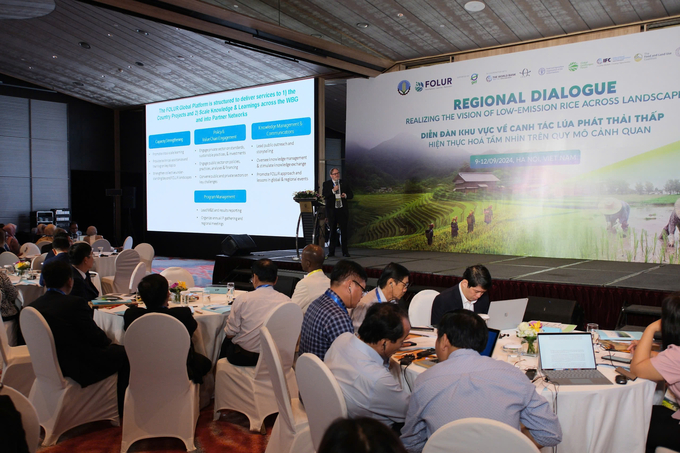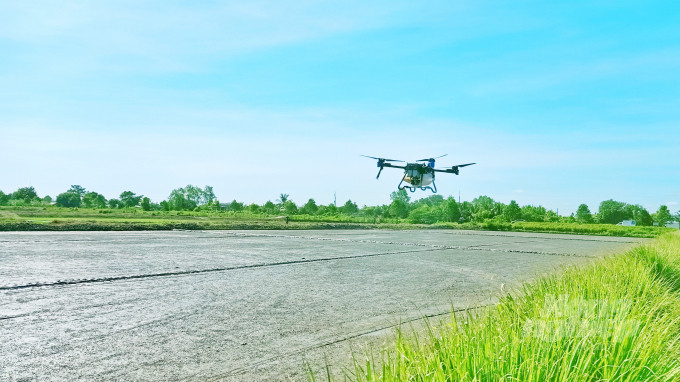November 19, 2025 | 23:38 GMT +7
November 19, 2025 | 23:38 GMT +7
Hotline: 0913.378.918
November 19, 2025 | 23:38 GMT +7
Hotline: 0913.378.918

Mr. Christopher Brett, Co-Lead of the Food Systems, Land Use, and Restoration Impact Program (FOLUR) and World Bank's Lead Agribusiness Specialist speaking at the conferrence. Photo: Quynh Chi.
Mr. Christopher Brett, Co-Lead of the Food Systems, Land Use, and Restoration Impact Program (FOLUR) and World Bank's Lead Agribusiness Specialist, shared with Vietnam Agriculture News the USD 345 million large-scale program that is currently operating in 27 countries and encompassing eight commodities.
FOLUR is currently conducting a project in the Mekong region, which is jointly financed by the government of Vietnam and the Global Environment Facility.
Brett believes that the program is especially beneficial in incorporating knowledge and insights regarding the important 1 million hectare rice program in Vietnam. This program primarily focuses on reducing rice's methane emissions throughout the Mekong region.
A Regional Dialogue of the Ministry of Agriculture and Rural Development of Vietnam (MARD) and the World Bank-led Food Systems, Land Use and Restoration (FOLUR) Impact Program “Realizing the vision of low-emission rice across landscapes” is comprised of approximately 140 participants. FOLUR is currently investigating various methods for producing sustainable rice, including reducing water, methane, and inputs, while simultaneously maintaining and increasing yields. This approach will enable farmers to benefit from lower production costs and higher revenues from high-quality rice.
"Our primary focus is on the landscape." Brett stated, "We are not solely interested in the one hectare of rice; we are also interested in the broader context of how we can achieve scaled intervention and scale change across the rice industry."
The FOLUR representative expressed that the World Bank is extremely proud to be collaborating with the government of Vietnam, which is making significant investments in high-quality irrigation, rural infrastructure, and innovation-related training and education.
Vietnam has progressed to the point where seeds are applied via drones, rather than by hand or tractor. Thus, Vietnam may be regarded as a pioneer in this regard, and FOLUR is eager to facilitate the transmission of Vietnam's expertise to Thailand, India, and other rice-producing nations.
"We also have a significant number of countries come from West Africa. These countries are beginning to understand the significance of the intensification of rice cultivation, as well as the necessity of appropriate government policies, institutions, and support through public investment." Brett further stated, "The World Bank is extremely proud to be collaborating with Vietnam. However, we are also exploring ways to transfer the knowledge gained from Vietnam to other countries."
The FOLUR Global Platform is instrumental in the dissemination of knowledge and best practices throughout the World Bank Group (WBG) initiatives and its partner networks. The platform delivers services to the country initiatives by collaborating closely with five core partners and several key networks, thereby establishing a framework for the exchange of insights and learning across various sectors and commodity groups.

Vietnam has progressed to the point where seeds are applied via drones, rather than by hand or tractor. Photo: VAAS.
The United Nations Development Program (UNDP) and the Food and Agriculture Organization (FAO) are among FOLUR's partners. The FAO is involved in initiatives to enhance sustainable food systems, while the UNDP's Good Growth Partnership emphasizes responsible business practices in value chains for soy, beef, and palm oil. Furthermore, the Food and Land Use Coalition endeavors to reevaluate the production and consumption of food in a manner that is beneficial to both the environment and human health. The Global Landscapes Forum, a knowledge platform concentrating on sustainable land use, and the International Finance Corporation (IFC), which invests throughout the agribusiness supply chain, are additional partners.
The successful engagement of both the public and private sectors is the foundation of FOLUR's strategy. FOLUR provides access to global knowledge and analytics, innovative policy approaches, and resources for public investments in the public sector. It also enables the exchange of best practices among its country initiatives and commodity groups. This exchange of knowledge is essential for the mobilization of resources for sustainable agricultural initiatives.
FOLUR collaborates with commodity platforms to offer technical assistance, training, and good practice guidelines in the private sector. These endeavors facilitate the mobilization of resources within agribusiness supply chains and create opportunities for investment in sustainable agriculture.
The FOLUR Impact Program is a groundbreaking initiative that aims to revolutionize the agricultural sector. It is poised to have an enduring influence on the production, distribution, and consumption of food due to its integration of global knowledge-sharing, country-specific action, and public-private collaboration. FOLUR provides a blueprint for attaining food security while safeguarding the environment by fostering sustainable, deforestation-free value chains and enhancing landscape-scale restoration.

(VAN) The agricultural sector agreed on a roadmap to pilot the MRV protocol and expand low-emission rice production from the 2025-2026 winter-spring crop.

(VAN) Agricultural extension officers in Quang Ninh do more than transmit knowledge; they have become a steadfast support system for farmers on the path to sustainable agricultural development.

(VAN) The development of a high-quality beef cattle herd has brought major benefits to livestock farmers, creating jobs and enabling better use of agricultural by-products.

(VAN) In the eastern region of Gia Lai, crossbred cattle now account for 93%, forming a high-quality beef herd and establishing a recognized brand, the result of 35 years of persistent effort.

(VAN) Integrating agricultural extension activities with ecotourism development unlocks promising new avenues for localities boasting specific advantages in grape and apple cultivation.

(VAN) Enterprises and cooperatives accompany farmers in Tay Ninh to develop an organic seedless lime growing area, paving the way for poverty reduction.

(VAN) There were times when Pho faltered, yet his aspiration to bring the pure aroma to those who truly value clean tea kept urging him forward.